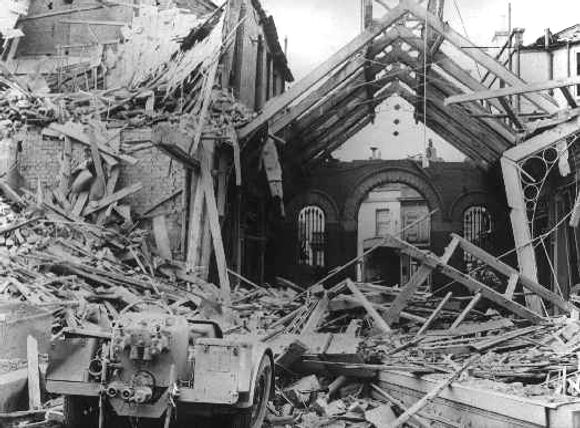The same old story – a cocktail of local government corruption, planning permission shenanigans, dodgy finance, bankruptcies, bad blood and worse debts
I’d been on the phone to Jules, picking over our belated realisation that the demolition of Gainsborough Studios has already begun. (At this point, I’m still labouring under the benighted misconception that The 39 Steps was shot at Gainsborough – it wasn’t, the interiors were shot at Gaumont Studios, Shepherd’s Bush, a facility that would later become BBC Lime Grove.)
I think I assumed that the Gainsborough situation, though desperate, was not serious. The notion, years ago, was that the building was to be gutted to make way for apartments. But when nothing actually happened, you began to suspect that here was the same old story – a cocktail of local government corruption, planning permission shenanigans, dodgy finance, bankruptcies, bad blood and worse debts.
And then the owners (whoever they were, really) began letting it out: the derelict shell of the building became a bleak post-industrial back-drop for, you know, cutting edge, uncompromising creativity – installations, guttersnipe gigs, agitprop theatre, illegal parties. If I thought anything about it all, I thought it would be like the Roundhouse – forever in limbo, condemned in theory but in practice absolutely refusing to die.
Anyway, just a few weeks ago, Jules didn’t much know or care about Gainsborough Studios – now he burns with the evangelical zeal of the recent convert.
It’s scandalous, utterly scandalous, he tells me. And the tragedy is it’s been going on for years, donkey’s years. The amount

The Gainsborough effect: labouring under a benighted misconception
of stuff that’s junked, it’s a ferocious erasure of history on a Stalinist scale.
Now and then, a Soho distributer or facilities house will change hands and the new owners will find all sorts of archive stuff down in the cellar or whatever and they’ll just hire a skip and fill it as quickly as they can. Even the BBC, which ought to know better, trashes hours of irreplaceable footage and other archive material each year. Classic works of art. Okay, maybe not works or art, but you know what I mean. Near enough. The long and the short of it is that for decades we’ve been burning the house down.
I listen until he runs out of steam, I put the phone down, I make myself a drink.
And then, watching TV not ten minutes later, the strangest thing.
I call him back.
“Jules? Are you watching telly?”
He gives a small sniff of laughter.
“What?” I ask.
“I don’t have a television,
remember?”
He’s absolutely right. I’ll give him that. He doesn't own a TV. So, what he can’t see is a segment of an arts magazine programme featuring some old guy, Jack Palmer, who’s the founder of the Palmer Film Archive, talking about some old film. There he is, in situ, being interviewed in a dark labyrinth of celluloid. He’s in a bucket chair in a big splash of spotlight and in the fringes of the half light beyond you can make out shelves of film cannisters.
“There’s a guy called Jack Palmer on BBC2. Have you heard of him?”
“Course I have. He owns the Palmer Archive. It’s the biggest privately held film collection in London. It’s just down the road.”
“Jules!”
“What?”
“How many weeks have we been banging our heads against a brick wall? You didn’t think to mention this before?”
“Oh,” he says. Just that: “Oh.”